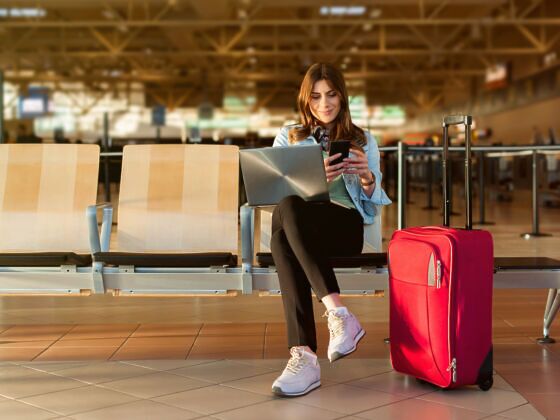Love it or hate it, artificial intelligence has been changing travel for years. Recently, advances in AI travel concierges like Matador Network’s GuideGeek take much of the searching and research for a trip out of Google and onto messenger platforms. With how fast things are moving, AI has the potential to change the travel landscape and life in general in seemingly endless ways.


Travel Experts Predict How AI Could Forever Change How We Vacation
That said, the AI boom is still in its nascent stages, and though its popularity and ubiquity is rapidly growing, the full effect of AI on travel – and other industries – won’t be felt in its entirety for several years. But according to travel experts, there are some ways people can speculate on what those changes may be.
I spoke with experts across the travel industry, from travel bloggers to local guides and tech pros, to get a sense of how industry insiders are feeling about AI. Depending on your perspective, the predictions are generally positive. While the advent of AI might come at the cost of familiar human touch points, it could also mean a more efficient airport experience, cheaper airfare, and more seamless hotel stays. Here’s what the experts had to say.
Pricing

Photo: Pixel-Shot/Shutterstock
Cost is one of, if not the, biggest factor in determining where someone travels, where they stay, and how they get there. AI might unnerve people in some ways, but it may also hold the potential to ease the cost associated with travel.
“My personal favorite change being implemented by using AI is dynamic pricing,” says Andrew Hellig of Travelers Worldwide. “Using machine learning models, AI programs can help airlines and hotels make sense of when and why people book flights. The airlines and hotels can then properly staff for peak times and modify their offerings to equally distribute the loads, and the best way to do this is to offer dynamic pricing. While you’ve heard the old adage that Sunday is the best day to book a flight, with AI hard at work, you’re going to see a lot more options to get a deal.”
If Hellig’s prediction pans out, that means more efficient airline operations will result in reduced airline cost, leading to lower prices for customers overall in addition to the shorter term benefit of being able to more easily identify the cheapest times to book.
According to Carlos Hunt, founder of Traveling Traces, “AI can monitor and analyze pricing patterns to determine the best time to book flights, hotels, and other travel services, potentially saving customers money and providing a more efficient booking experience.
The airport experience

Photo: Tyler Olson/Shutterstock
AI will also potentially affect the traveler experience from the minute we show up to the airport.
Hunt predicts that “AI will play a significant role in improving airport efficiency and security, such as facial recognition for faster check-ins, AI-powered security systems, and intelligent luggage tracking.”
Travel blogger Jane Jones of See Sight Tours agrees, especially when it comes to security efficiency and effectiveness. “AI-based security scanners can detect potential threats, speeding up the security screening process while reducing the chances of false alarms,” she says.
Liz Ho, camping guide and founder of Camping Guidance, has an even more bullish outlook on AI in airports.
“AI will enable travelers to breeze through airports with ease,” she says. “Self-check-in kiosks, biometric authentication, and facial recognition technology are already being implemented at various airports worldwide. These advancements will streamline check-in and eliminate long queues at security checkpoints. AI-powered chatbots and virtual assistants will also give travelers real-time information on flight delays, gate changes, and baggage tracking.”
The Hotel Experience
Mandy Murry, founder of Hospitality Concierge, believes the rise of AI will revolutionize the way hotels communicate with their guests.
“If a guest messages about their reservation or stay that is currently in process,” she says, “[the AI software] will move that message to the top. Whereas, if a guest messages about a stay three or four months from now, it will move that message to its appropriate place in the queue. This helps prioritize messaging responses for employees. AI apps will also create automated responses such as emails after check-outs and a bot chat during the stay.”
Philip Ballard of HotelPlanner believes AI will help hotels create more touch points with guests, and help deliver a better hospitality experience.
“HotelPlanner predicts that some hotels will start using AI tools to personalize and customize their service down to the unique needs and wants of every customer,” he says. “AI will also be used to engage guests throughout their travel journey using AI chatbot messaging apps and contact check-in and payment systems.”
AI travel assistants may also be able to help you decide if you want to book the hotel in the first place through descriptions and recommendations.
Planning Your Trip
@michaelmotamedi Date night in Mexico City controlled by A.I. We let a travel guide A.I tell us what to do for an entire night. We enjoyed some of the best speakeasies in the city. I travel the world and eat a lot of food. If you are into either of those things, I would love if you came a long. #traveltiktok #mexicocity #travellife #foodtiktok #michaelmotamedi #guidegeek ♬ Spanish Guitar for Western Movies or Games – Hanadayama Music Lab
When it comes to formulating an itinerary and deciding what to do on a trip, AI has the answer for that, too, says Leonard Crist, owner of Gators and Ghosts New Orleans Tours.
“The scenario I envision is the guest is on your website, they open your chatbot and ask specific questions about your city and what there is to do, and it spits out relevant answers that lead them to a purchase,” he says. “That would be useful for the guest and for [travel providers].”
By having an automated concierge that travelers can tap for information, destinations can customize an itinerary to suit a traveler’s specific needs, help them find out what to do in a city, and send helpful recommendations aggregated from multiple online sources. Tour operators like Gators and Ghosts can use this technology to better serve customers and give them quick information not only on their specific tour, but on the city as a whole. Tourism boards could also employ chatbot technology to create a one-stop-shop for travelers looking for information on their city.
AI could also change the trip planning experience by combining the many different aspects of creating an itinerary and travel plan. “In a sea of options, travelers have to spend lots of time just trying to put a working schedule together,” says Alvaro Melendez, CEO of CRANT, a cutting-edge AI company. “AI will facilitate this process by connecting transport, accommodation, hospitality and entertainment options and making the whole experience seamless.”
How AI will change traveling with pets

Photo: nadisja/Shutterstock
It’s pretty clear that AI will, in some form or other, impact the future of travel for humans. But what about our pets? Traveling with pets is growing in popularity. According to one study, 78 percent of American pet owners traveled with their pet in 2021. Still, doing so often poses a series of frustrating logistical and procedural hurdles. As it turns out, AI make some of these hurdles more manageable.
Nina Clapperton, founder of Traveling With Your Pets, travels full-time with her two-year-old golden retriever service dog, Theo.
“AI will make traveling so much easier for pet owners, people with disabilities, and anyone with unique interests or dietary needs,” Clapperton says. “And airports, right? They can be such a headache, especially if you’re traveling with pets. But with chatbots and voice assistants, you’ll be able to get flight updates, gate changes, and airport maps super quickly. Plus, AI can help pet owners figure out how to get their furry friends through security without any issues.”
Beyond airports, she also emphasizes the potential benefits of AI once you’re actually in the destination. That includes finding the right hotel and crafting a pet-friendly itinerary.
“Finding pet-friendly places to stay and things to do is gonna be a breeze with AI,” she predicts. “You’ll be able to use search engines and apps to find hotels, restaurants, and attractions that love pets just as much as you do. And the best part is, these platforms can even recommend stuff based on your pet’s size, breed, and age – like pet-friendly beaches, parks, and hiking trails.”
An AI’s perspective
In the end, it’s all just speculation. No one really knows how AI will impact travel. Maybe the best answer, though, comes from a chatbot itself. When I asked GuideGeek “how will AI affect the travel industry?” it replied: “Artificial intelligence has already started to impact travel in numerous ways that make it easier for travelers to plan their trips. AI-powered virtual assistants like myself can provide customized recommendations and personalized itineraries based on travelers’ preferences, while machine learning algorithms can analyze large volumes of data to offer more competitive prices for travel services. In the future, AI will likely continue to help travelers maximize their experiences while minimizing the costs and time involved in planning a trip.”
Whether you trust the experts or GuideGeek more, they’re all saying the same thing. And maybe that’s the point.